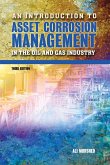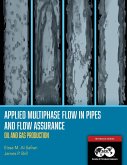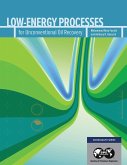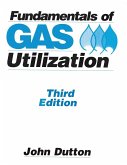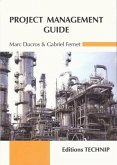- Broschiertes Buch
- Merkliste
- Auf die Merkliste
- Bewerten Bewerten
- Teilen
- Produkt teilen
- Produkterinnerung
- Produkterinnerung
This book explores the myriad issues that play out in the upstream petroleum industry of Ghana from a legal perspective.
Andere Kunden interessierten sich auch für
![An Introduction to Asset Corrosion Management in the Oil and Gas Industry, Third Edition An Introduction to Asset Corrosion Management in the Oil and Gas Industry, Third Edition]() Ali MorshedAn Introduction to Asset Corrosion Management in the Oil and Gas Industry, Third Edition176,99 €
Ali MorshedAn Introduction to Asset Corrosion Management in the Oil and Gas Industry, Third Edition176,99 €![Nodal Analysis of Oil and Gas Production Systems Nodal Analysis of Oil and Gas Production Systems]() Jan Dirk JansenNodal Analysis of Oil and Gas Production Systems228,99 €
Jan Dirk JansenNodal Analysis of Oil and Gas Production Systems228,99 €![Applied Multiphase Flow in Pipes and Flow Assurance - Oil and Gas Production Applied Multiphase Flow in Pipes and Flow Assurance - Oil and Gas Production]() Eissa Al-SafranApplied Multiphase Flow in Pipes and Flow Assurance - Oil and Gas Production284,99 €
Eissa Al-SafranApplied Multiphase Flow in Pipes and Flow Assurance - Oil and Gas Production284,99 €![Low-Energy Processes for Unconventional Gas Recovery Low-Energy Processes for Unconventional Gas Recovery]() Reza FassihiLow-Energy Processes for Unconventional Gas Recovery276,99 €
Reza FassihiLow-Energy Processes for Unconventional Gas Recovery276,99 €![Fundamentals of Gas Utilization Fundamentals of Gas Utilization]() John DuttonFundamentals of Gas Utilization45,99 €
John DuttonFundamentals of Gas Utilization45,99 €![Petroleum Nanobiotechnology Petroleum Nanobiotechnology]() Nour Shafik El-GendyPetroleum Nanobiotechnology113,99 €
Nour Shafik El-GendyPetroleum Nanobiotechnology113,99 €![Project Management Guide Project Management Guide]() Marc DucrosProject Management Guide44,99 €
Marc DucrosProject Management Guide44,99 €-
-
-
This book explores the myriad issues that play out in the upstream petroleum industry of Ghana from a legal perspective.
Hinweis: Dieser Artikel kann nur an eine deutsche Lieferadresse ausgeliefert werden.
Hinweis: Dieser Artikel kann nur an eine deutsche Lieferadresse ausgeliefert werden.
Produktdetails
- Produktdetails
- Verlag: Taylor & Francis
- Seitenzahl: 354
- Erscheinungstermin: 8. Oktober 2024
- Englisch
- Abmessung: 234mm x 156mm x 20mm
- Gewicht: 531g
- ISBN-13: 9781032462684
- ISBN-10: 103246268X
- Artikelnr.: 71581034
- Herstellerkennzeichnung
- Produktsicherheitsverantwortliche/r
- Europaallee 1
- 36244 Bad Hersfeld
- gpsr@libri.de
- Verlag: Taylor & Francis
- Seitenzahl: 354
- Erscheinungstermin: 8. Oktober 2024
- Englisch
- Abmessung: 234mm x 156mm x 20mm
- Gewicht: 531g
- ISBN-13: 9781032462684
- ISBN-10: 103246268X
- Artikelnr.: 71581034
- Herstellerkennzeichnung
- Produktsicherheitsverantwortliche/r
- Europaallee 1
- 36244 Bad Hersfeld
- gpsr@libri.de
Thomas Kojo Stephens is a Senior Lecturer at the University of Ghana School of Law and lectures in both the LLB and LLM Programs, lecturing among others, Conflict of Laws/Private International Law, Research Methodology, Energy Law, and Natural Resources Law, and supervises in the PhD Program. He is a Senior Partner at Stobe Law and the Head of the Transactional, Energy Practice, as well as the Consultancy Group of the firm. He advises numerous entities in the petroleum sector and serves as principal consultant for a number of high-profile entities. He is the jurisdictional author for a number of international publications in Petroleum Law and has written on different facets of the industry. He is an Advisory Board Member of the International Energy Law Advisory Group (IELAG), a Principal Trainer at the International Energy Law Training and Research Center (IELTRC), and was a Vice-Chairman of Ghana's Public Interest and Accountability Committee (PIAC) from 2018 to 2020, a statutory body with oversight over the use of Ghana's petroleum revenue.
Contents
Acknowledgments
List of Acronyms and Abbreviations
INTRODUCTION
Overview
PART I: CONSTITUTIONAL, STATUTORY AND ORGANIZATIONAL
FRAMEWORKS FOR THE REGULATION OF GHANA'S UPSTREAM
PETROLEUM INDUSTRY
Chapter 1 - GHANA'S UPSTREAM PETROLEUM INDUSTRY
1.0 Introduction
1.1 Ghana's Sedimentary Basins
1.2 Pre-Commercial Discovery
1.3 Post-Commercial Discovery
Chapter 2: CONSTITUTIONAL FRAMEWORK FOR THE
REGULATION OF GHANA'S PETROLEUM INDUSTRY
2.0 Introduction
2.1 Natural Resources: Background to Ghana's Constitutional
Framework after Independence (Republican Era)
2.2 The Transpositions to the 1992 Constitution
2.3 The 1992 Constitution
2.4 Conclusion
Chapter 3: STATUTORY FRAMEWORK FOR THE
REGULATION OF GHANA'S PETROLEUM INDUSTRY
3.0 Introduction
3.1 Overview of Statutory Framework of Ghana's Upstream Petroleum Industry
3.2 Ghana's Statutory Framework for the Petroleum Industry - Pre-Commercial
Discovery
3.3 Ghana's Statutory Framework for the Petroleum Industry -
Post-Commercial
Discovery
3.4 Evolution of the Current Legislative Framework for the Regulation of
Petroleum Operations - Post-Commercial Discovery
3.5 Approach to Development of Legislation for the Regulation of Petroleum
Operations
3.6 The Petroleum (Exploration and Production) Bill, 2010
3.7 Major Defect in the Petroleum (Exploration and Production) Bill, 2010
3.8 'Death' of the Petroleum (Exploration and Production) Bill, 2010
3.9 The Petroleum (Exploration and Production) Bill, 2013
3.10 The Petroleum (Exploration and Production) Bill, 2014.
3.11 The Petroleum (Exploration and Production) Bill, 2016
3.12 Petroleum (Exploration and Production) Act, 2016 (Act 919).
3.13 Conclusion
Chapter 4: ORGANIZATIONAL FRAMEWORK FOR THE
REGULATION OF GHANA'S PETROLEUM INDUSTRY
4.0 Introduction
4.1 Approaches to Organizational Framework for Regulation
4.2 The Organizational Structure of Ghana's Upstream Petroleum Industry
4.3 Establishment of the Petroleum Commission
4.4 The Petroleum Commission Act, 2011 (Act 821)
4.5 Ghana National Gas Company
PART II: THE CONTRACTUAL FRAMEWORK FOR THE
REGULATION OF GHANA'S UPSTREAM PETROLEUM INDUSTRY
Chapter 5: LICENSING
5.0 Introduction
5.1 Licensing in Ghana Pre-2016
5.2 Some Events that Precipitated a Desire to Move to the Competitive
Bidding System
5.3 Licensing in Ghana Post 2016 - Competitive Bidding
5.4 Conclusion
Chapter 6: THE CONTRACTUAL FRAMEWORK FOR THE REGULATION OF GHANA'S
PETROLEUM INDUSTRY
6.0 Introduction
6.1 The Model Petroleum Agreement
6.2 Petroleum Costs
6.3 Conclusion
PART III: PETROLEUM REVENUE MANAGEMENT FRAMEWORK,
DEVELOPMENTS, AND EVOLVING MATTERS IN THE INDUSTRY
Chapter 7: PETROLEUM REVENUE MANAGEMENT IN GHANA
7.0 Overview
7.1 Sources of Petroleum Revenue
7.2 The Petroleum Holding Fund
7.3 Earmarked Locations for Distribution of Funds
7.4 Summary of the Disbursement of the Revenue as Prescribed by the PRMA
7.5 The Petroleum Wealth Fund (PWF)
7.6 Institutions under the Framework of the PRMA
7.7 Challenges with Petroleum Revenue Management in Ghana
7.8 Conclusion
Chapter 8: EVOLVING MATTERS AND CONCLUDING OVERVIEW
8.0 Introduction
8.1 The Energy Transition: Global Developments and the Impact on Ghana
8.2 Proposed Efforts to Counteract Adverse Impact of Global Developments
arising from the Energy Transition
8.3 Concluding Review
Index
Acknowledgments
List of Acronyms and Abbreviations
INTRODUCTION
Overview
PART I: CONSTITUTIONAL, STATUTORY AND ORGANIZATIONAL
FRAMEWORKS FOR THE REGULATION OF GHANA'S UPSTREAM
PETROLEUM INDUSTRY
Chapter 1 - GHANA'S UPSTREAM PETROLEUM INDUSTRY
1.0 Introduction
1.1 Ghana's Sedimentary Basins
1.2 Pre-Commercial Discovery
1.3 Post-Commercial Discovery
Chapter 2: CONSTITUTIONAL FRAMEWORK FOR THE
REGULATION OF GHANA'S PETROLEUM INDUSTRY
2.0 Introduction
2.1 Natural Resources: Background to Ghana's Constitutional
Framework after Independence (Republican Era)
2.2 The Transpositions to the 1992 Constitution
2.3 The 1992 Constitution
2.4 Conclusion
Chapter 3: STATUTORY FRAMEWORK FOR THE
REGULATION OF GHANA'S PETROLEUM INDUSTRY
3.0 Introduction
3.1 Overview of Statutory Framework of Ghana's Upstream Petroleum Industry
3.2 Ghana's Statutory Framework for the Petroleum Industry - Pre-Commercial
Discovery
3.3 Ghana's Statutory Framework for the Petroleum Industry -
Post-Commercial
Discovery
3.4 Evolution of the Current Legislative Framework for the Regulation of
Petroleum Operations - Post-Commercial Discovery
3.5 Approach to Development of Legislation for the Regulation of Petroleum
Operations
3.6 The Petroleum (Exploration and Production) Bill, 2010
3.7 Major Defect in the Petroleum (Exploration and Production) Bill, 2010
3.8 'Death' of the Petroleum (Exploration and Production) Bill, 2010
3.9 The Petroleum (Exploration and Production) Bill, 2013
3.10 The Petroleum (Exploration and Production) Bill, 2014.
3.11 The Petroleum (Exploration and Production) Bill, 2016
3.12 Petroleum (Exploration and Production) Act, 2016 (Act 919).
3.13 Conclusion
Chapter 4: ORGANIZATIONAL FRAMEWORK FOR THE
REGULATION OF GHANA'S PETROLEUM INDUSTRY
4.0 Introduction
4.1 Approaches to Organizational Framework for Regulation
4.2 The Organizational Structure of Ghana's Upstream Petroleum Industry
4.3 Establishment of the Petroleum Commission
4.4 The Petroleum Commission Act, 2011 (Act 821)
4.5 Ghana National Gas Company
PART II: THE CONTRACTUAL FRAMEWORK FOR THE
REGULATION OF GHANA'S UPSTREAM PETROLEUM INDUSTRY
Chapter 5: LICENSING
5.0 Introduction
5.1 Licensing in Ghana Pre-2016
5.2 Some Events that Precipitated a Desire to Move to the Competitive
Bidding System
5.3 Licensing in Ghana Post 2016 - Competitive Bidding
5.4 Conclusion
Chapter 6: THE CONTRACTUAL FRAMEWORK FOR THE REGULATION OF GHANA'S
PETROLEUM INDUSTRY
6.0 Introduction
6.1 The Model Petroleum Agreement
6.2 Petroleum Costs
6.3 Conclusion
PART III: PETROLEUM REVENUE MANAGEMENT FRAMEWORK,
DEVELOPMENTS, AND EVOLVING MATTERS IN THE INDUSTRY
Chapter 7: PETROLEUM REVENUE MANAGEMENT IN GHANA
7.0 Overview
7.1 Sources of Petroleum Revenue
7.2 The Petroleum Holding Fund
7.3 Earmarked Locations for Distribution of Funds
7.4 Summary of the Disbursement of the Revenue as Prescribed by the PRMA
7.5 The Petroleum Wealth Fund (PWF)
7.6 Institutions under the Framework of the PRMA
7.7 Challenges with Petroleum Revenue Management in Ghana
7.8 Conclusion
Chapter 8: EVOLVING MATTERS AND CONCLUDING OVERVIEW
8.0 Introduction
8.1 The Energy Transition: Global Developments and the Impact on Ghana
8.2 Proposed Efforts to Counteract Adverse Impact of Global Developments
arising from the Energy Transition
8.3 Concluding Review
Index
Contents
Acknowledgments
List of Acronyms and Abbreviations
INTRODUCTION
Overview
PART I: CONSTITUTIONAL, STATUTORY AND ORGANIZATIONAL
FRAMEWORKS FOR THE REGULATION OF GHANA'S UPSTREAM
PETROLEUM INDUSTRY
Chapter 1 - GHANA'S UPSTREAM PETROLEUM INDUSTRY
1.0 Introduction
1.1 Ghana's Sedimentary Basins
1.2 Pre-Commercial Discovery
1.3 Post-Commercial Discovery
Chapter 2: CONSTITUTIONAL FRAMEWORK FOR THE
REGULATION OF GHANA'S PETROLEUM INDUSTRY
2.0 Introduction
2.1 Natural Resources: Background to Ghana's Constitutional
Framework after Independence (Republican Era)
2.2 The Transpositions to the 1992 Constitution
2.3 The 1992 Constitution
2.4 Conclusion
Chapter 3: STATUTORY FRAMEWORK FOR THE
REGULATION OF GHANA'S PETROLEUM INDUSTRY
3.0 Introduction
3.1 Overview of Statutory Framework of Ghana's Upstream Petroleum Industry
3.2 Ghana's Statutory Framework for the Petroleum Industry - Pre-Commercial
Discovery
3.3 Ghana's Statutory Framework for the Petroleum Industry -
Post-Commercial
Discovery
3.4 Evolution of the Current Legislative Framework for the Regulation of
Petroleum Operations - Post-Commercial Discovery
3.5 Approach to Development of Legislation for the Regulation of Petroleum
Operations
3.6 The Petroleum (Exploration and Production) Bill, 2010
3.7 Major Defect in the Petroleum (Exploration and Production) Bill, 2010
3.8 'Death' of the Petroleum (Exploration and Production) Bill, 2010
3.9 The Petroleum (Exploration and Production) Bill, 2013
3.10 The Petroleum (Exploration and Production) Bill, 2014.
3.11 The Petroleum (Exploration and Production) Bill, 2016
3.12 Petroleum (Exploration and Production) Act, 2016 (Act 919).
3.13 Conclusion
Chapter 4: ORGANIZATIONAL FRAMEWORK FOR THE
REGULATION OF GHANA'S PETROLEUM INDUSTRY
4.0 Introduction
4.1 Approaches to Organizational Framework for Regulation
4.2 The Organizational Structure of Ghana's Upstream Petroleum Industry
4.3 Establishment of the Petroleum Commission
4.4 The Petroleum Commission Act, 2011 (Act 821)
4.5 Ghana National Gas Company
PART II: THE CONTRACTUAL FRAMEWORK FOR THE
REGULATION OF GHANA'S UPSTREAM PETROLEUM INDUSTRY
Chapter 5: LICENSING
5.0 Introduction
5.1 Licensing in Ghana Pre-2016
5.2 Some Events that Precipitated a Desire to Move to the Competitive
Bidding System
5.3 Licensing in Ghana Post 2016 - Competitive Bidding
5.4 Conclusion
Chapter 6: THE CONTRACTUAL FRAMEWORK FOR THE REGULATION OF GHANA'S
PETROLEUM INDUSTRY
6.0 Introduction
6.1 The Model Petroleum Agreement
6.2 Petroleum Costs
6.3 Conclusion
PART III: PETROLEUM REVENUE MANAGEMENT FRAMEWORK,
DEVELOPMENTS, AND EVOLVING MATTERS IN THE INDUSTRY
Chapter 7: PETROLEUM REVENUE MANAGEMENT IN GHANA
7.0 Overview
7.1 Sources of Petroleum Revenue
7.2 The Petroleum Holding Fund
7.3 Earmarked Locations for Distribution of Funds
7.4 Summary of the Disbursement of the Revenue as Prescribed by the PRMA
7.5 The Petroleum Wealth Fund (PWF)
7.6 Institutions under the Framework of the PRMA
7.7 Challenges with Petroleum Revenue Management in Ghana
7.8 Conclusion
Chapter 8: EVOLVING MATTERS AND CONCLUDING OVERVIEW
8.0 Introduction
8.1 The Energy Transition: Global Developments and the Impact on Ghana
8.2 Proposed Efforts to Counteract Adverse Impact of Global Developments
arising from the Energy Transition
8.3 Concluding Review
Index
Acknowledgments
List of Acronyms and Abbreviations
INTRODUCTION
Overview
PART I: CONSTITUTIONAL, STATUTORY AND ORGANIZATIONAL
FRAMEWORKS FOR THE REGULATION OF GHANA'S UPSTREAM
PETROLEUM INDUSTRY
Chapter 1 - GHANA'S UPSTREAM PETROLEUM INDUSTRY
1.0 Introduction
1.1 Ghana's Sedimentary Basins
1.2 Pre-Commercial Discovery
1.3 Post-Commercial Discovery
Chapter 2: CONSTITUTIONAL FRAMEWORK FOR THE
REGULATION OF GHANA'S PETROLEUM INDUSTRY
2.0 Introduction
2.1 Natural Resources: Background to Ghana's Constitutional
Framework after Independence (Republican Era)
2.2 The Transpositions to the 1992 Constitution
2.3 The 1992 Constitution
2.4 Conclusion
Chapter 3: STATUTORY FRAMEWORK FOR THE
REGULATION OF GHANA'S PETROLEUM INDUSTRY
3.0 Introduction
3.1 Overview of Statutory Framework of Ghana's Upstream Petroleum Industry
3.2 Ghana's Statutory Framework for the Petroleum Industry - Pre-Commercial
Discovery
3.3 Ghana's Statutory Framework for the Petroleum Industry -
Post-Commercial
Discovery
3.4 Evolution of the Current Legislative Framework for the Regulation of
Petroleum Operations - Post-Commercial Discovery
3.5 Approach to Development of Legislation for the Regulation of Petroleum
Operations
3.6 The Petroleum (Exploration and Production) Bill, 2010
3.7 Major Defect in the Petroleum (Exploration and Production) Bill, 2010
3.8 'Death' of the Petroleum (Exploration and Production) Bill, 2010
3.9 The Petroleum (Exploration and Production) Bill, 2013
3.10 The Petroleum (Exploration and Production) Bill, 2014.
3.11 The Petroleum (Exploration and Production) Bill, 2016
3.12 Petroleum (Exploration and Production) Act, 2016 (Act 919).
3.13 Conclusion
Chapter 4: ORGANIZATIONAL FRAMEWORK FOR THE
REGULATION OF GHANA'S PETROLEUM INDUSTRY
4.0 Introduction
4.1 Approaches to Organizational Framework for Regulation
4.2 The Organizational Structure of Ghana's Upstream Petroleum Industry
4.3 Establishment of the Petroleum Commission
4.4 The Petroleum Commission Act, 2011 (Act 821)
4.5 Ghana National Gas Company
PART II: THE CONTRACTUAL FRAMEWORK FOR THE
REGULATION OF GHANA'S UPSTREAM PETROLEUM INDUSTRY
Chapter 5: LICENSING
5.0 Introduction
5.1 Licensing in Ghana Pre-2016
5.2 Some Events that Precipitated a Desire to Move to the Competitive
Bidding System
5.3 Licensing in Ghana Post 2016 - Competitive Bidding
5.4 Conclusion
Chapter 6: THE CONTRACTUAL FRAMEWORK FOR THE REGULATION OF GHANA'S
PETROLEUM INDUSTRY
6.0 Introduction
6.1 The Model Petroleum Agreement
6.2 Petroleum Costs
6.3 Conclusion
PART III: PETROLEUM REVENUE MANAGEMENT FRAMEWORK,
DEVELOPMENTS, AND EVOLVING MATTERS IN THE INDUSTRY
Chapter 7: PETROLEUM REVENUE MANAGEMENT IN GHANA
7.0 Overview
7.1 Sources of Petroleum Revenue
7.2 The Petroleum Holding Fund
7.3 Earmarked Locations for Distribution of Funds
7.4 Summary of the Disbursement of the Revenue as Prescribed by the PRMA
7.5 The Petroleum Wealth Fund (PWF)
7.6 Institutions under the Framework of the PRMA
7.7 Challenges with Petroleum Revenue Management in Ghana
7.8 Conclusion
Chapter 8: EVOLVING MATTERS AND CONCLUDING OVERVIEW
8.0 Introduction
8.1 The Energy Transition: Global Developments and the Impact on Ghana
8.2 Proposed Efforts to Counteract Adverse Impact of Global Developments
arising from the Energy Transition
8.3 Concluding Review
Index


